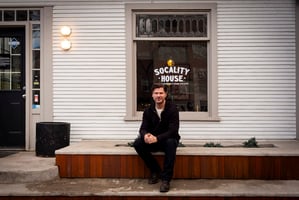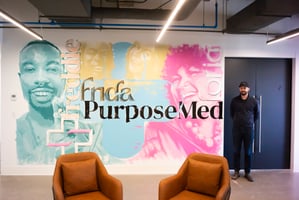I've been looking forward to meeting Scott for a long time. I remember finding his work years and...
Addy Graves, Cashew CEO & Co-Founder
I recently had the chance to chat with Addy Graves, Co-Founder and CEO of Cashew.
Cashew is a fully guided research software to get you thinking less like a marketer, and more like your customer.

Who is Addy?
What immediately comes to mind is my professional career. I’ve worked in market research my whole career. When I say market research, I mean talking to people usually through surveys. We do primary research. I started my career at Ipsos, a big, corporate organization, and moved to Calgary in 2012 as a researcher. I worked there for 5 years, then moved agency side at Critical Mass. It was always my dream to work at an agency, I just loved marketing and branding, and I love giving brands insight to make themselves better. I led the research team there for 6 years, and worked with amazing clients like Apple, all the while I was building Cashew on the side of my desk with my Co-Founder Rose, who I met at Ipsos and always kept in touch with.
I’m trying to make professional market research accessible to businesses of any size. Historically this hasn’t been possible due to how expensive it can be to get expertise. We’re using AI and a beautiful user experience to do that for all businesses. There are a few ways to describe what we do but it’s like what Canva has done for graphic design, making it accessible for everyday users to create impressive visuals without needing traditional graphic design tools. We want to do that with how businesses understand their customer. Instead of just writing up a questionnaire, we’re embedding all our industry expertise into methodologies, frameworks, the right audience to target, and also how you decide to analyze the results.
I’ve spoken to a few founders who don’t necessarily know how to build their product, but they know how to be a great founder. With your background, how have you found the inverse of this? Knowing how to create your product but learning how to be a founder as you go.
I think it’s a lot of mistakes. You’re just immersed in this world of startups and tech and investors and it’s nothing you really learned in your role in the past, at least for me. What prepared me the most for it was being a manager and being able to get people excited. Attracting talent comes naturally to me, ensuring they are happy and challenged. But speaking the investor language with metrics and financials is a whole other ballgame. I feel like it’s taken me like two years to get a grasp of it, but it's gotten me a lead investor and closing our round . We’re on our way, but no matter how many Y-Combinator videos you watch, you still feel like an imposter. I need to learn by doing, and I don’t have the confidence unless I’ve done it myself. Now, I feel like I’m getting there.

Is that how you’ve always learned? Doing it yourself even with possible mistakes?
For sure, I didn’t even feel confident in my skills as a researcher until I did a certain number of projects and worked with a certain number of clients. Then you know you can do it yourself; you know what it entails. I haven’t been the best at faking it till you make it in my career, it was the same with being a founder. You really have to run the company then you feel better about it. But it’s all trial by fire.
Where do you think the confidence in making first-time decisions comes from?
It’s knowing the industry so well and having been a researcher for so long. And knowing the customer because I am the customer, to a certain extent. The experience and seeing how many opportunities there are gives me the confidence to know we’re doing the right thing. However, we made so many mistakes when designing the product. We thought researchers would just use it, but we’ve uncovered a whole audience of customers that don’t necessarily know how research works so they need the industry expertise. I guess it’s making mistakes and just learning by doing. Otherwise, I wouldn’t be as confident in solving the things we see firsthand.
And the passion behind the research. I’ve always been super passionate about market research, something that may not sound that interesting to a lot of people. I find it fascinating, and I know how to do it better than it’s been done traditionally. I’m super passionate about making the customer the center of the business.
When I typically think of research, I think of somewhat of a distance or a barrier between the customer and the researcher. How do you overcome this and make the customer center?
Our original mission statement was ‘Creating mutual benefit between the researcher and the respondent’. Our goal initially was to make it transparent, so the respondent always knew why the survey was important, who it’s coming from, and what the business is trying to solve. And same for the business, so they know who the respondents are, the experience they are getting, and what their compensation for the survey. But I agree, I think it needs to be done better; our area of focus is creating that feedback loop between the two audiences so they both understand each other. It can be easy to look at respondents as numbers and you’re just trying to achieve a certain sample size, but we need to remember they’re people.
There are a few ways to bring in the connection, for example, having a video of me at the start or the survey saying ‘Hi, I’m Addy, here’s the context for this survey’. Having a quasi-face-to-face interaction. There are also ways you can tell if someone is telling the truth, which can be quite eye-opening as you explore biometrics and lie detection techniques.

I feel like that’s what a lot of Startups are getting at, is bringing the individual or the personal back into business; trying to do things better than they’ve been done. With that, how did you find the transition into the Startup space in this industry?
I think to start, our industry is extremely traditional and corporate. It all started about 50 years ago really, and it was all based on academia. It was always academics with a statistics background setting the rules for market research, not being biased, achieving a sample size, and randomizing samples. I did all that, but what we’re trying to do is reimagine that experience. The environment has completely changed, it’s all digital now, you’re not calling people and you’re not meeting with them one on one. So, do those principles set 50 years ago still make sense? If they do, how do you replicate them in a digital sense? We think they don’t, we don’t agree that the academic standards need to be in place for a business to understand their customer. There’s so much you don’t know about the user online, there’s so much digitally that doesn’t have a friendly tone so you don’t know if you’re getting how someone truly feels. Our tagline is ‘Uncovering the whole truth about your customer’ over just getting a data point. I have experience with the standards, but I think you have a lot of wiggle room in making it friendlier or easier to understand to allow them to feel more comfortable.
I worked in Lottery and Gaming research for many years which involved traveling across the U.S. to collaborate with companies, many of which were government-run and had an antiquated view of research. It didn’t align with my values, and my Co-Founder and I didn’t relate to it. But when I went to Critical Mass, I felt like I found my people, so many of my co-workers started businesses. And so many people we have at Cashew are from Critical Mass. They had something really special.

It seems like in some ways data collection has become passive for the respondent, what do you think about newer models of market research?
I used to think that you should probably be in the mindset of answering questions before answering them. I don’t love when you’re trying to relax on TikTok and you get asked questions like ‘Did you see an ad for this?’ or “Would you purchase something from this?’. It’s abrupt and messes up the flow. Going back to the connection, it’s ‘Why is this question being asked?’. It’s weird to me. I like our app because our users are going into the Cashew app to answer surveys, they know exactly what to expect. I do understand we need to open that up more, there are communities to tap into without only creating our own. But we have to be smart about where we tap in. Social media doesn’t really feel like that to me, maybe LinkedIn because you’re in a learning mindset. But we have to be conscious of how it shows up because it can feel abrupt and just not right.

What have you been into lately?
I’m mostly listening to podcasts, I gravitate towards the All-In podcast, and I love the Y-Combinator content. I love hearing about Founders and their story, the How I Built This podcast. I have a goal to not consume content related to work in my very precious free time, but when I have to stay up on everything that’s happening in the space, I feel like I have to use the time to educate myself on topics like who’s raising money or public perceptions on AI.
I have kids so the time spent on content is rare now.
How have you found balancing raising kids and being a founder?
It’s difficult, but I honestly feel like I’ve been the most productive in the two years since I’ve had kids than I have been in my whole life. You have to be, you have this amount of time to do this amount of things and there’s no deviating. And when it’s 5 to 7 o’clock when my kids are home, I’m as present as possible. I think of my time as chunks, and I have to get certain things done in that time or else I’ll be up all night and feel like crap the next day. But it is a constant challenge.
How do you feel about being a female founder?
I’ve felt pretty supported and haven’t noticed too many negatives, but I feel like you have to speak a certain language when it comes to raising money. Raising money is a different game and I feel like you can be taken less seriously if you don’t have a finance background or don’t talk about your company in a VC way. I feel like a lot of my women founder friends have a different way of talking about their company, in that it’s more related to the vision and how they're gonna get there, whereas some men I’ve spoken to are very gifted at speaking to the metrics. I’ve been up against men that have super impressive finance backgrounds, and I come in like ‘Marketing’, and it can feel stereotypical. I feel like I’m challenged way more. And I’ve been told ‘You don’t have enough SaaS metrics’ or that there’s not enough rigor behind the pricing model. It’s more when we get into the conversation it seems like they don’t have confidence in me. And they want to hear certain buzzwords which I maybe don’t have. I think investors are becoming more cognizant about it, but the data doesn’t necessarily show. I also think women don’t necessarily go into the space as often, maybe because of a lack of confidence in raising money, it can seem more daunting.


How do you stay healthy and grounded?
I run marathons. My parents ran marathons, it was always part of my life. I started in high school training with them. I’ve never gone a week without running even in the busiest times. It’s like how can you pitch your business if you don’t feel good?
The distance is so much longer than you would think, you could be injured or want to give up and you just decide to keep going for whatever reason. But it’s just so much longer than you think. The last 10k of a race, you’re already done after the first 30k. You think you literally can’t take another step but by the end, you’ve done it somehow.
It’s felt so similar to founding this business, where you keep thinking ‘We’re almost there, we’ll close this raise and everything’s gonna change.’ And then a curveball happens, and you just think ‘When will we ever get to the next step?’. But you just keep going when you think you can’t. I think that’s one of the most important things as a founder. You have to be so resilient to the point where you probably shouldn’t try anymore but you do because you believe in it so much. You’ve gotta keep going or you won’t make it.

From what I’ve seen, 2024 is going to be a great year for y’all. What’s coming up?
I think so too, it’s all coming together. I love the team we’ve built, I’m so excited about the technology. We bootstrapped for so long and now we’ll finally get some capital to have some wiggle room to take marketing seriously and really go to market. We were able to do so much with so little, I’m excited to see what we can do with a bit of room to breathe.
What do you have to say to the person thinking about leaving their cushy job and starting something crazy?
I’ll put it into two buckets. I would make sure whatever the topic is, you have to have so much passion for it. You need 100%, to the point where you’re willing to defend it till the end. And second, resilience. People will tell you you’re crazy and it won’t work but you have to keep going. You have to stay at it, but it’s worth it.
Finally, I don’t know what you would call it, but you need to have a chip on your shoulder. You need to want to prove something or be annoyed about something to the extent you’re willing to do something crazy. I just don’t think you’d be willing to go through all the hardship without it. It’s like a challenger mindset to change the status quo.
Thank you Addy! Thank you Rose and James!



